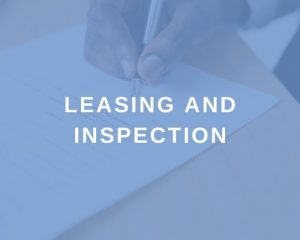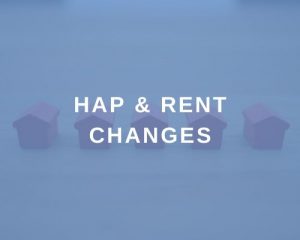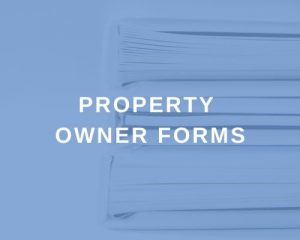Leasing and Inspection
REQUEST FOR TENANCY APPROVAL
If you wish to rent to an HCV family, and enjoy a number of benefits including lower vacancy rates, tenant stability, free property inspections and eligibility for a reduction in property taxes you should inform HACCC of the availability of your property. Ultimately, it is the HCV family’s decision whether or not to rent your property. Of course, as the landlord, you would screen the HCV family just as you would any other prospective tenant. The following steps summarize the process to become an HCV landlord:
- Market your property once HCV participant is selected
- Complete and submit a Request for Tenancy Approval (RTA)
- Pass Housing Quality Standards (HQS) Inspection
- Complete suitability screening
- Execute lease and Housing Assistance Payment (HAP) contract
- Comply HUD and HACCC’s rules and regulations (enforce lease)
For more information see the Property Owner Guidebook and Owner Lease-Up Packet.
INITIAL AND BIENNIAL INSPECTIONS
The housing unit selected by the family must meet an acceptable level of health and safety before the HACCC can approve the unit. When the voucher holder finds a unit that it wishes to occupy and reaches an agreement with the landlord over the lease terms, the HACCC must inspect the dwelling and determine that the rent requested is reasonable. HACCC will inspect the subsidized unit annually to determine that it meets HQS.
MOST COMMON HQS FAIL ITEMS
- Inoperable light fixtures and improperly wired electrical outlets (reverse polarity, open ground, hot neutral reverse, etc.)
- Deteriorated and unstable paint on surfaces (peeling, cracking, chipping, etc.) in units built prior to 1978 where children under the age of six reside or will reside
- Missing, inoperable or incorrectly mounted smoke and carbon monoxide detectors
- Broken or inoperable windows (cracked glass panes, broken locks, drafty frames, etc.)
- Exposed electrical wires/connections (light fixtures missing globes, electrical junction boxes missing cover plates or knockout plugs, breaker boxes with open sockets, etc)
- Broken/faulty door locks and drafty doors
- Cutting hazards, including protruding sharp nails pipes/metals objects with jagged edges, deteriorated sheet metal, cracked glass blocks on windows,etc.
- Gaps/holes around heating system flue pipes and gas utility not in service
- Evidence of rodent and/or bug infestation
- Holes and large gaps (more than a quarter inch) on walls/ceilings/floors of living space areas
For additional information about HQS inspections see the Owner Guidebook.
BIENNIAL INSPECTIONS: The Housing Authority of the County of Contra Costa will now be conducting our HQS Inspections every other year as opposed to annually. The transition process will be as follows:
OTHER TENANCY RELATED INFO
Payment standards represent the maximum amount of subsidy that HACCC can provide a family. HACCC does not automatically approve this rent level for a given unit. HACCC’s monthly rent subsidy depends on a number of factors, including payment standards, the rents of other comparable unsubsidized rental units in the area, and the income of the family. Visit the Owner Forms page to see HACCC’s most recent Payment Standards. As part of HACCC’s commitment to provide voucher holders access to more Contra Costa County neighborhoods, HACCC implemented an Exception Payment Standard policy.
Please visit the FAQ and HAP and Rent Change page for information on the Rent Determination Process and procedures on approving rent increases.
UTILITY ALLOWANCE:
Participants in the HCV program pay approximately 30% of their income for rent and utilities. The Department of Housing and Urban Development (HUD) has defined Total Tenant Payment (TTP) for “rent” to include both shelter and the costs for reasonable amounts of utilities. The amount determined necessary cover the resident’s reasonable utility costs is the utility allowance. Please visit the Owner Forms page to see HACCC’s most recent Utility Allowance Schedule.
DETERMINING REASONABLE RENT
When determining the rent offer made to an owner, HUD regulations require the amount is supported by the market. HACCC establishes the rental value of the unit by examining comparable units in the area, ensuring the appropriate amount is provided to the property owner. Visit the FAQ page for information on the methodology for determining reasonable rent.
LANDLORD PORTAL
The Landlord Portal is a link on the Housing Authority’s website (contracostahousing.org) that provides Landlords participating in HCV Program with access to Tenant, Unit and Financial Information.
1.Click on the Landlord Portal Link
2.Click the link that says “ Click Here to Register”
3.Enter your Registration Code:3036-L and Vendor# Example: 3036-L12345
4.Enter your Tax ID/SSN without dashes
IMPORTANT: Tax ID/SSN must match what is currently on file.
Information available on the portal
Payments: HAP Payment Details, EFT bank account details used for direct deposit
1099s: Current and Past 1099s listed by Year
Announcements & Forms: Communications & Payee Forms
Units: Address, Number of Bedrooms,
Families: Caseworker information, HAP Payment amount, Lease information
Profiles: Payee contact information
Inspections: Inspection results & scheduled inspections
Frequently asked questions
Who is eligible to set up a Rent Café Portal Account? Any designated Housing Assistance Payment (HAP) payee with 1-10 units may set up an account.
I cannot set up a password. Note: The password must contain all of the following:
- Eight characters
- One upper case character (A, B, C..)
- One lower case character (a,b,c..)
- One number digit (1,2,3..)
- One non-alphanumeric character (@#$%!)
What if I see incorrect information in my profile?
- Payee Profile information can be updated on the Landlord profile.
- You can verify conflicting Tenant Information by contacting your tenant’s Caseworker
- HAP Payment discrepancies contact fiscal department at (925) 957-8000






